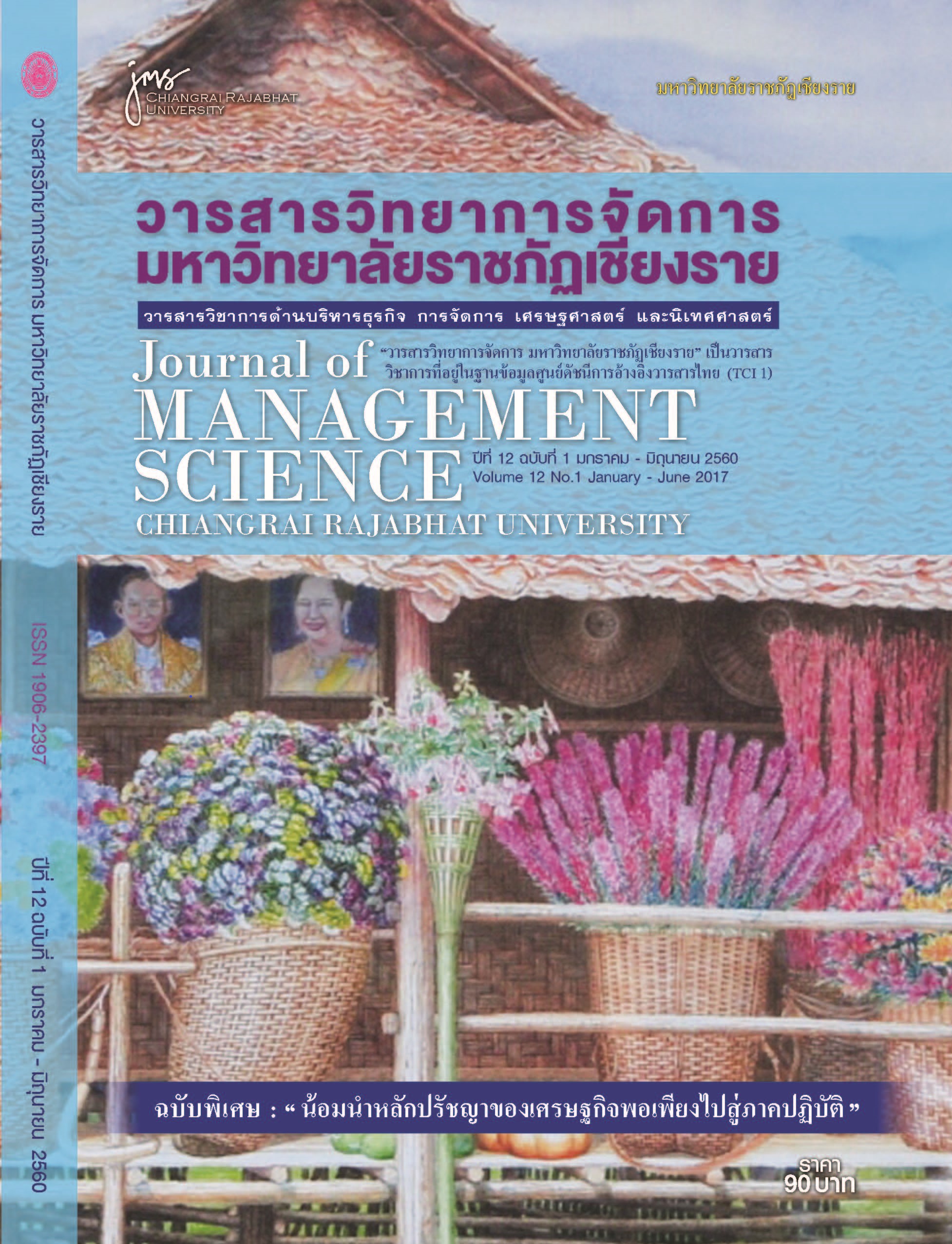The Diffusion of Philosophy of the Economic Sufficiency in Thai Mass Media, and Understanding and Acceptance of People in Chiang Rai Province*
Main Article Content
Abstract
The research aimed to analyze the diffusion of philosophy of the economic sufficiency in Thai mass media and to study the level of understanding and acceptance and apply the philosophy in Chiang Rai people’s daily lives. The research was completed through the quantitative and qualitative methodology by using questionnaire survey, content analysis, depth interview and focus group interview. The findings were as follows:
- Regarding to the diffusion of philosophy of the economic sufficiency in Thai mass media showed that:
1.1 With regard to the newspaper media, it has presented the content of the economic sufficiency philosophy dealing with projects the most. The content was focused on the royal practice of economic sufficiency philosophy and honored His Majesty the King. The philosophy’s explanation and definition was still abstract. The readers had to think and interpret about the application of the philosophy.
1.2 With regard to the radiobroadcast, it has mostly presented in a form of lecture and dialogue involved with the distinct explanation of the philosophy’s definitions from various kinds of people in different professions, for example, farmers, businessmen, government officers, and so on. In addition, it also presented in a form of news dealing with the royal projects and the dialogue concerned different kinds of people with their outstanding experiences or the common people applying the philosophy of the economic sufficiency in their daily lives invited and talked with the disc jockey. They could also share their experiences and knowledge on the philosophy clearly and help more understanding and attract the audiences.
1.3 With regard to television media, it has presented the application of the philosophy of the economic sufficiency into several organizations the most. The educational organization was supported by the producers the most. The programs’ objectives were concerned the collaboration of the organizations and the communities and presented the application of the philosophy to the solutions successfully. The problems were inclusive in every aspect, for example, people’s living, environment, culture, and so on. The program’s duration was 5-8 minutes and mostly presented in a form of documentary and its content was useful and could help the people more understanding. The pictures could also tell and help the people understand easily and extend the concept in every aspect of the society. In addition, the language was also simple and in sequence and obviously explained the specific or academic vocabularies, and so on.
- The study result of the people’s level of understanding of the economic sufficiency philosophy, were overall at a high level, especially in terms of sufficiency, rationale, self-immunity, self-reliance, sharing with families and neighbors and saving, and so on.
- The study result of the acceptance and application to the philosophy in Chiang Rai people’s daily lives were overall at a high level, especially in terms of honesty in profession, supporting Thai people in morality. Regarding to the application, it was overall at a high level, especially, in terms of doing business, developing efficiency production, regularly improving the quality of products, reasonably pricing, and accounting for expenditure and savings review.
Article Details
Views and opinions expressed in the journal do not necessarily reflect those of the editors.
References
จิรายุ อิศรางกูร ณ อยุธยา. (2548). การขับเคลื่อนเศรษฐกิจพอเพียง. วารสารเศรษฐกิจและสังคมสำนักงานคณะกรรมการพัฒนาการเศรษฐกิจและสังคมแห่งชาติ. ปีที่ 42 ฉบับที่ 6.
ปาณิสรา วัฒนรัตน์. (2550). การเปิดรับชม ความรู้ ทัศนคติและพฤติกรรมการปฏิบัติตนตามแนวเศรษฐกิจพอเพียงจากรายการโทรทัศน์ . วิทยานิพนธ์มหาบัณฑิต บัณทิตวิทยาลัย มหาวิทยาลัยธรรมศาสตร์.
สุเมธ ตันติเวชกุล. (2542). การดำเนินชีวิตในระบบเศรษฐกิจพอเพียง “ แบบพอเพียง” ตามแนวทางพระราชดำริ. กรุงเทพมหานคร . วารสารน้ำ การประปา-ส่วนภูมิภาค. ธันวาคม2541 – มกราคม 2542.
อภิชัย พันธเสน และคณะ. (2546). การประยุกต์พระราชดำริเศรษฐกิจพอเพียงกับอุตสาหกรรมขนาดกลางและขนาดย่อม. กรุงเทพมหานคร : สำนักงานกองทุนสนับสนุนการวิจัย.
อรวรรรณ ปิลันธน์โอวาท. (2546). การสื่อสารเพื่อการโน้มน้าวใจ. กรุงเทพมหานคร : สำนักพิมพ์จุฬาลงกรณ์มหาวิทยาลัย.
Bloom, Benjamin., Thomas, J., and Madus, G. (1971). Handbook on Formative and Sumative Evaluation of Student Learning. New York : MacGraw-Hill Book Company.
Rogers, Everett. M. (1995). Diffusion of Innovations. 4th ed. New York, NY: The Free Press.
Schramm, Wilbur. (1964). Mass media and National Development : the Role of Information in the Developing Countries. California : Stanford University Press.
Zimbardo, P. G., and Leippe, M. (1991). The Psychology of Attitude Change and Social Influence. 3rd ed. New York: McGraw-Hill.


